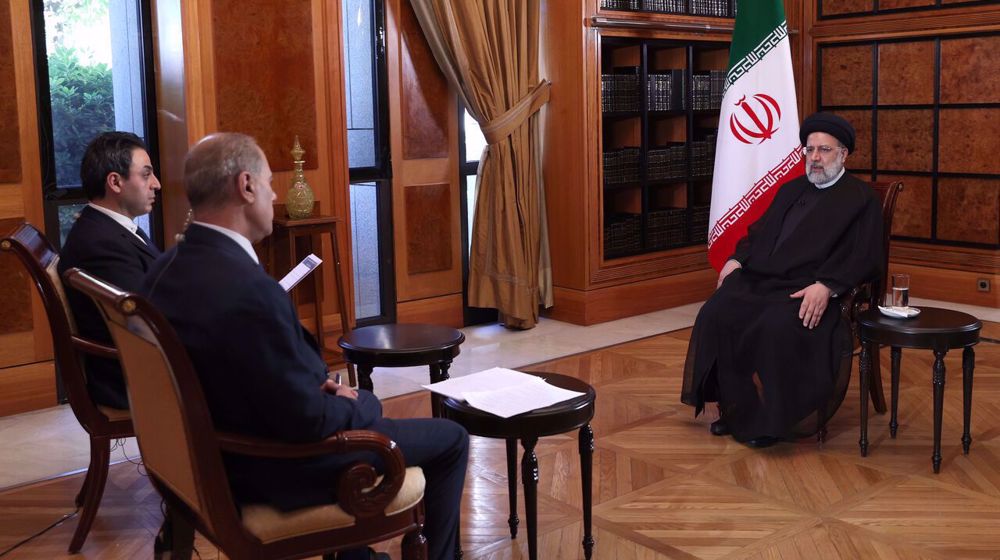AhlulBayt News Agency: Iran's President Ebrahim Raeisi hails the region's resistance movement for its major contribution to Syria's triumphant victory over a terror campaign waged against it by the US and the Israeli regime.
"The axis of evil, led by the Zionist regime and the US, plotted and implemented various conspiracies against Syria," the president said in an interview on Monday with the Syrian Arab News Agency (SANA) and its state television following his recent state visit to the Arab nation.
"They (the US and the Israeli regime) were after destabilizing Syria and disrupting security there by throwing support behind terrorist and Takfiri groups as well as seeking disintegration and bloodshed in Syria," the Iranian chief executive remarked.
"Syria, [however], stood up to the sedition [waged] by the Americans and the Zionist regime for 12 years," Raeisi emphasized, noting that after all these years,"the situation has become completely different across Syria."
Raeisi further pointed out how so many countries that had previously collaborated against Damascus, had come to revisit their attitude towards the Arab country in light of its successful efforts in face of the massive foreign-sponsored campaign of terror.
"[Now,] what has happened [here]? Resistance has proved effective," Raeisi said, adding that the US and the Israeli regime have realized that they had committed a "miscalculation" about Syria.
'US Created Daesh, then purported to fight against it'
Elsewhere in his remarks, Raeisi pointed to admissions by numerous US officials, themselves, that Washington had established the Takfiri terrorist group of Daesh.
"One of America's presidential candidates mentioned this [again] that 'we created Daesh.' This is an official and clear admission," Raeisi said, referring to recent remarks by US 2024 presidential hopeful Robert F. Kennedy Jr.
The Takfiri group came into existence in 2014 when Washington was running out of excuses to extend its meddling in the West Asia region or enlarge it in scale. The US and its allies then invaded Syria under the pretext of fighting the outfit.
Raeisi, meanwhile, ridiculed "how the Americans, who have admitted to creating Daesh, had the nerve to later claim that they were seeking to fight Daesh and terrorism?"
Iran ready to mediate between Syria, Turkey
The Iranian president further expressed Iran's readiness to mediate between Syria and neighboring Turkey towards resolution of existing tensions between the two countries.
The neighbors have been at odds since 2016, when Turkey invaded northern Syria in declared efforts to push back against Kurdish militants, whom the Turkish state regards as allies of the anti-Ankara Kurdistan Workers' Party (PKK).
Syria has repeatedly denounced the military intervention as illegal, calling on Ankara to pull out its forces.
Raeisi noted how Iran had used the most recent round of negotiations among the Islamic Republic, Turkey, and Russia in the Kazakh capital of Astana, to underline Syria's sovereignty over the entirety of its soil, and lay emphasis on the need for the Syrian state to be tasked with establishing security across the Arab country's border with Turkey.
"Provision of security to the border areas and elimination of insecurity would only be possible through the Syrian state's [exercising of its] sovereignty over the entirety of the country," he stated.
Iran-Saudi ties
Asked about the recent rapprochement between Iran and Saudi Arabia, the president said, "We have never identified Saudi Arabia as our enemy and will never do so [either]. This is the Islamic Republic's principled position."
Saudi Arabia severed its diplomatic relations with Iran in 2016 following demonstrations held in front of the Saudi Embassy in Tehran and its Consulate in the northeastern city of Mashhad by angry protesters censuring the Al Saud family for the execution of a top Shia scholar Nimr al-Nimr.
On March 10, following several days of intensive negotiations hosted by China, the countries agreed to resume their diplomatic relations and reopen their embassies and diplomatic missions after the seven-year-long estrangement.
"Iran and Saudi Arabia are two great countries in
the region," whose relations can contribute to standing equations in the
region, Raeisi emphasized.
/129

